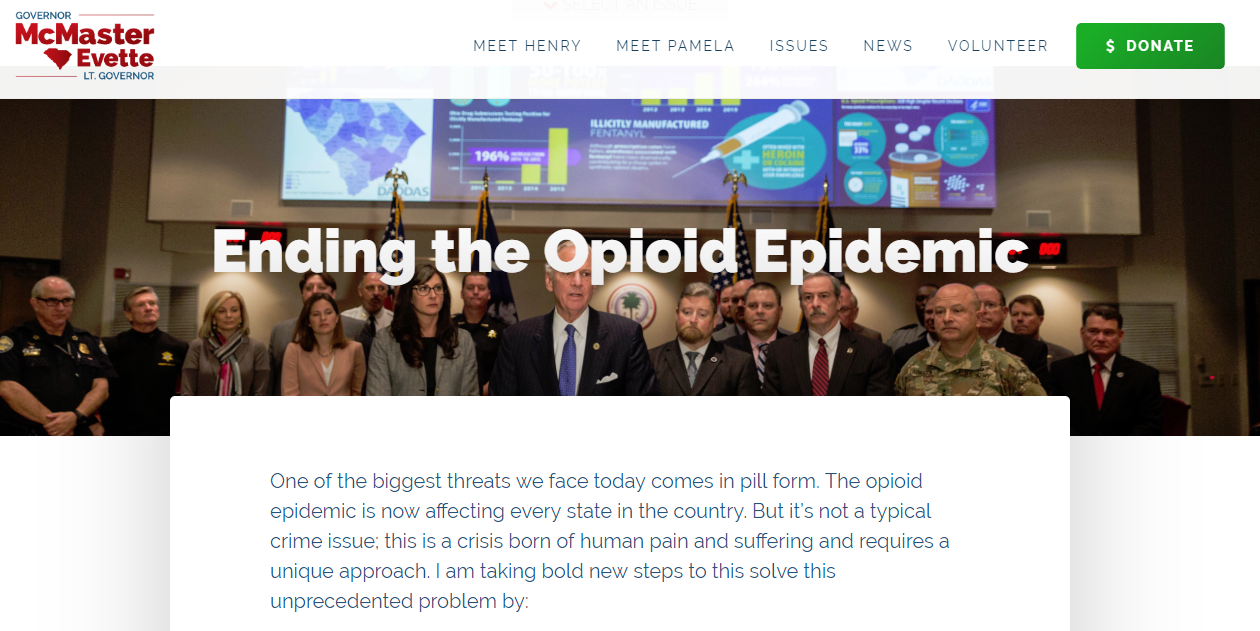When it comes to health care, Republican incumbents are waging defensive campaigns, attacking challengers who support Medicare for All or defusing criticism over their position on pre-existing conditions. But some vulnerable conservatives have found solace in one bipartisan issue: the opioid crisis.
Drug overdoses are ravaging Republicans and Democrats alike. So in an effort to capture more voters, Republican incumbents in tight races are touting their legislative work on combating the epidemic.
“With people like Vern on our side, we have a fighting chance,” says a mother who lost her son to drug addiction in a political advertisement for Rep Vern Buchanan (R-FL).
According to the ad, the Florida congressman has “led the charge to crack down on drug abuse.” But a closer look at his record shows this isn’t true. Indeed, legislation he supported could have exacerbated a crisis that’s killed more than 5,000 Floridians within one year, as of Feb. 2018. And he’s hardly alone with this framing.
Buchanan has introduced various opioid bills and the House even passed one of his proposals in June that would centralize all federal opioid prescribing guidelines. The bill, the Centralized Opioid Guidance Act, was bipartisan and applauded by Rep. Conor Lamb (D-PA).
But experts told The New York Times that 50 opioid bills, including Buchanan’s, that the House passed over the summer “fall short of the coordinated response warranted by an epidemic” — albeit, it’s a step in the right direction.
Alternatively, Buchanan voted to eliminate a systems approach to the opioid crisis by voting to repeal the Affordable Care Act (ACA), which provides greater access to substance use disorder (SUD) treatment. In other words, he voted for the American Health Care Act, which would have undermined Obamacare insurance gains and the requirement to cover essential health benefits including SUD treatment. The bill would have also phased out Medicaid expansion and capped funding — and, as addiction-treatment advocate Andrew Kessler recently told ThinkProgress, “no public health problem can be solved without it.”
ThinkProgress identified four other Republicans who are campaigning on solutions, but who’ve backed proposals that undermine the fight against the opioid crisis in other ways.
Voting to repeal Obamacare
Reps. John Faso (R-NY) and Kevin Yoder (R-KS) aired ads mentioning the opioid crisis, but with a law enforcement edge.
“John’s legislation is empowering law enforcement to stop this drug from coming into this country,” says one mother whose son was addicted to the powerful synthetic opioid, fentanyl.
“We’ve got to secure our border to stop the drugs causing the opioid crisis from flowing into our communities,” says Yoder during his “For All of Us” ad.
It’s unclear whether this message resonates with voters. Frontline experts, for one, are wary of a law and order approach. When The New York Times in February asked 30 experts — including a police chief, governor, and medical director — how they’d spend $100 billion to solve the opioid crisis, the panelists spent more money on treatment than anything else, including law enforcement. No dollars went to border security.
Like Buchanan, Faso and Yoder voted to repeal Obamacare. Ultimately, Republicans were unsuccessful in their efforts. While these lawmakers aren’t actively campaigning on repeal and replace (in fact, Yoder’s 2018 campaign website scrubbed any such reference to the law unlike his 2016 site), the Vice President admitted that Republicans will try again if midterm elections go well for the party.
Governors who dismiss Medicaid
Governors Scott Walker (R-WI) and Henry McMaster (R-SC) are campaigning on the national drug crisis. Walker finds himself in an especially tight race this November with Democrat Tony Evers; a recent poll puts Evers ahead. Meanwhile, McMaster is expected to hold on to his seat.
In Walker’s ad, the governor alludes to the fact that he’s signed about 30 opioid bills into law. “Together, we passed bipartisan legislation to reduce opioid abuse and increase drug treatment to save lives,” he says.
But local officials have criticized his efforts, with one calling them “narrowly-targeted opioid proposals,” because Walker continues to oppose the ACA. In fact, Walker has refused to expand Medicaid, arguing, “if we were to take the Medicaid expansion, we would be going contrary to what my intentions were which is to help people not be dependent on the government.” He’s also asked the Trump administration to allow Wisconsin to condition Medicaid access on work and drug tests, which experts call insulting and say will lead to losses in coverage.

McMaster — who’s in a less competitive race — actually ran an ad touting his support for Medicaid work requirements. However, McMaster may never get his work rules, as the Trump administration has yet to approve a request from a state like South Carolina, which didn’t expand Medicaid.
By not expanding Medicaid, McMaster is rejecting federal dollars for more treatment. Research from five states shows Medicaid expansion was associated with a significant increase in people filling prescriptions for addiction medication. So even though the governor declared the opioid crisis a public health emergency, he didn’t take advantage of all resources at his disposal — a fact he omitted in his campaign site.
Republicans’ parsing the opioid crisis from their entire health record is likely deliberate. Polls suggest that parts of the GOP health care agenda will hurt Republicans in November.
